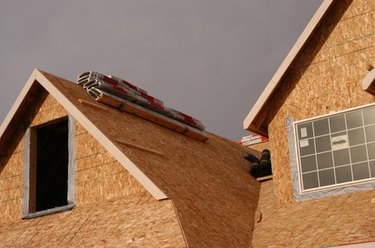
Roofing felt, or tar paper, is infused with a petroleum-based solution to provide an additional layer of roof protection under shingles. Although tar paper has traditionally been the standard undercoating for shingles, as of 2010, synthetics are becoming more popular as an underlayment.
15 Pound Roofing Felt
Video of the Day
Tar paper comes in two different weights, or thicknesses. The lowest thickness is 15-pound felt. This means that 100 square feet of the felt weighs 15 pounds. This weight of tar paper may tear and tends to create holes around the roofing nails.
Video of the Day
30-Pound Felt
Roofing felt in a 30-pound weight is heavier: 30 pounds per 100 square feet. This means it is less prone to tearing. It lays down on the roof sheathing more easily than 15-pound, and often has fewer wrinkles. It provides more of a barrier to water that may seep between shingles or tiles.
Synthetic Underlayment
Synthetic underlayment is made of polyethylene or polypropylene polymers rather than fiberglass or polyester fleece. It does not tear, and creates a tight seal around nails. Additionally, it allows the roof to "breathe," unlike standard, tar-infused felt, which may create a vapor barrier and trap moisture between the shingles and sheathing.